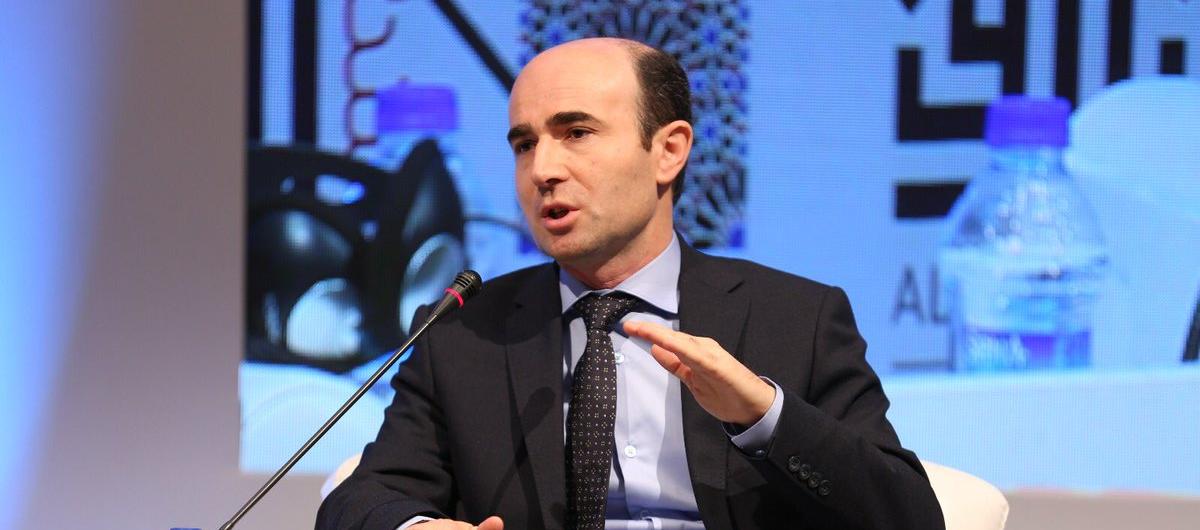It Is Time to Revise Russia–Turkey Relations for a More Stable Future
(votes: 5, rating: 5) |
(5 votes) |
MA in Middle Eastern Studies
With ongoing debates on Russian-made S-400 deliveries to Turkey, fate of continuing cooperation of Russia, Turkey and Iran in Syria and future of Ankara’s relations with the European Union and NATO, it is high time to make an honest review of Russian-Turkish relations, define weaknesses of bilateral cooperation and try to sketch a framework for a better future. Inspection of historical legacy and nature of current ties may be of big value for those who want to grasp contours of common future. Analysis of existing political constellations in both countries, study of actors who shape or strive to shape bilateral relations and investigation of today’s cases of regional cooperation between Turkey and Russia may further contribute to explaining trajectory of bilateral relations.
Even though one may witness rapid development of political ties between Turkey and Russia in recent years, relations are not immune to unforeseeable shocks. Heavy accent on political dialogue, political connections and consultations between the governments may be of great importance in general, but at times reveal that it is insufficient for development of full-fledged relations. Today’s cooperation between Moscow and Ankara in Syria serves as a good platform for both to test their political trust and to learn to listen to each other’s concerns, which so far have been largely ignored or pushed out of the agenda. Despite current existing moods in Europe and the United States on Turkey planning to leave the NATO, analysis of historical legacy and present situation in the world suggest that Turkey neither would prefer nor would afford to leave the Western security and political structures. On the other hand, Turkey’s rapprochement with the West would not be necessarily against interests of Russia. Interconnectedness of Turkey with Europe and USA may be of good utility for Russian global foreign policy. Current positive dialogue, however, should be used to include non-state non-official players and give them space to direct and shape bilateral relations. Their presence and contribution would be a best guarantee against political fluctuations which we will definitely witness in the future.
With ongoing debates on Russian-made S-400 deliveries to Turkey, fate of continuing cooperation of Russia, Turkey and Iran in Syria and future of Ankara’s relations with the European Union and NATO, it is high time to make an honest review of Russian-Turkish relations, define weaknesses of bilateral cooperation and try to sketch a framework for a better future. Inspection of historical legacy and nature of current ties may be of big value for those who want to grasp contours of common future. Analysis of existing political constellations in both countries, study of actors who shape or strive to shape bilateral relations and investigation of today’s cases of regional cooperation between Turkey and Russia may further contribute to explaining trajectory of bilateral relations.
Historical background
During the first years of the Russia–Turkey relations after the collapse of the Soviet Union were defined by views of leaderships that were formed during the Cold war era. In the aftermath of the Independence War, Kemalist regime viewed its ties with the Soviet Union as a political alternative for Ankara's relations with the European countries. The balanced approach in cooperation with the Soviets was gradually complicated by Moscow's insistence upon Ataturk to redesign Turkey’s political regime according to the socialist principles. Left-leaning members of the Kemalist establishment came to support this idea.
Relations with Moscow were further marred after 1945 with the USSR threatening to reconsider the Straits regime and change Turkey’s eastern borders. Later, Soviet officials in later did confirm that Stalin's insistence was a primary reason for Turkey's decision to ally itself with Western powers. The Soviet Union interpreted Turkish participation in the Marshall plan, membership in the NATO under the Eisenhower Doctrine were as a further step to get security guarantees in face of the Soviet threats. On the other hand, it also prompted Moscow to consider Turkey’s foreign policy as being to a large extent defined by the NATO strategic plans rather than national interests.
The crisis in Turkey’s relations with its traditional allies over the Cyprus issue in 1964 and later in 1974 showed the Soviets that Turkey was increasingly diverging from the western line. The Soviets saw this situation as an opportunity to relaunch contacts with Ankara. From the mid 1970-s, the relations between the USSR and Turkey started gaining their own logic and that was largely expressed in trade, gas, and technology exchange cooperation. Soviet invasion of Afghanistan and Moscow's support for the Workers' Party of Kurdistan, on the other hand, didn't allow these improvements to gain larger potency.
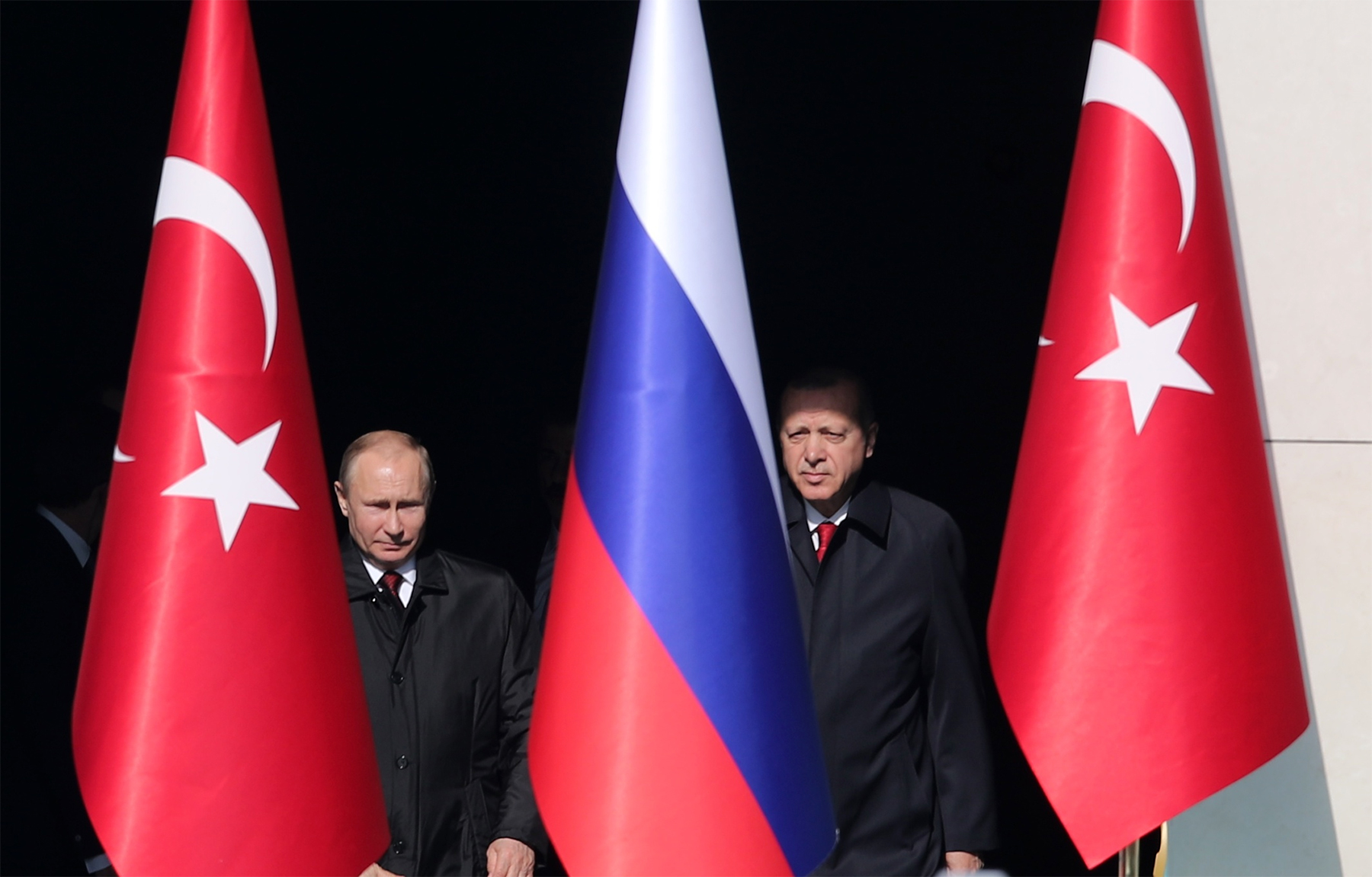
Russia–Turkey Relations Need a Stronger Foundation
Gradual transformation from competition to cooperation
It is against this background that bilateral relations were developing in the 1990s. Political elites in both countries were still thinking in terms of bipolar confrontation and felt a lot of distrust towards each other. On the other hand, both countries were experiencing profound difficulty in finding their places in a new world defined by instability around their borders and lack of acceptable set of rules of global political engagement.
Areas that Russian elites viewed as Russia's traditional sphere of influence were witnessing increased involvement of Western and global players. Growing instability in the Caucasus, Central Asia, the Balkans did not allow both countries to reshape their perception of each other and find a common ground. Relations were further complicated by the fact that Russia perceived Turkey as a tool in the hands of Western powers to minimize Russian presence.
With regard to the Caucasus and Central Asia, Turkey had very good potential to become a driver of positive political and economic changes. With the fall of the Soviet Union and collapse of bipolar competition Turkey lost its strategic importance in the Western eyes and this fact made Turkish elites look for areas where Turkey could be again an important ally.
By the 1990s it was evident that the countries’ elites were gradually moving from confrontation and competition, concentrating on areas that were mutually benefiting. Two points should be stressed here: this decision was a result of political will and had non-partisan character meaning that this approach enjoyed legitimacy among broader groups of political elites. Secondly, problematic areas in bilateral relations were not resolved or given increased attention but rather mitigated and pushed from the agenda.
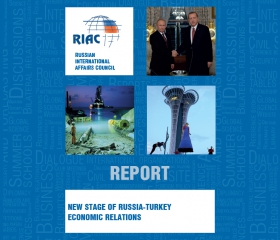
New Stage of Russia–Turkey Economic Relations
Since the later years of the Cold war, certain areas have been pushing both countries to more cooperation and trust. These areas became relevant in the Russia–Turkey relations as well. Trade agreements on gas were a primary area where both countries had a chance to prove themselves as reliable partners. For Turkey, it was important to get stable contracts on gas deliveries for its growing economy during 1990s. For Russia, it was important to have Turkey as a reliable transit partner for its gas supplies to the European markets.
Economic cooperation and increasing mutual interdependence stimulated contacts in other areas, including construction. Turkish companies became especially famous in Russia for their road building technologies, and Russian companies were welcomed in Turkey due to their know-hows in building of large infrastructure objects like factories, dams, channels, or nuclear plants. Further areas included production and manufacture facilities in Russia, especially in culturally affiliated republics like Tatarstan.
Political leadership
It is important to note that since 2000s cooperation in these areas didn’t lead to increasing influence or effectiveness of lobbying among economic groups. Many experts point to the considerable control of formal politics over the business in both countries: with exemption big economic projects like Akkuyu NPP or TurkStream gas pipeline, economic and business ties don’t define political agenda between Turkey and Russia, commercial activity heavily dependent on political decisions and rapport. Although, this is less relevant for Turkish case since in Turkish export to Russia dominate goods and products produced by a large number of smaller local producers.
Predominance of political leadership in channelling of the bilateral relations is another dimension. Heads of state in Turkey and Russia are viewed as key actors who define bilateral relations. This also suggests that relations lack deeper institutionalization despite rich scope of agreements signed in the last 15 years: Moscow and Ankara are struggling to bring bilateral relations onto more stable and rigid foundation, which makes relations susceptible to situational politics. The establishment of the High-Level Cooperation Council in 2010, i.e. 20 years after the collapse of the Soviet Union, shows how slow the progress in this direction really is.
The lack of stable institutional base is coupled with the lack of unity in ideological views on a series of issues dealing with global and regional agendas. Turkey’s foreign policy is defined by personal interests of the country’s leadership, who has been trying to consolidate power within close circle of people loyal to Erdogan. Foreign policy decision-making process in both countries is very personalized: even though bilateral relations are not driven by common values and norms, as in the Turkey–NATO relations in their best years, both Moscow and Ankara may pursue personal political gains.
Nevertheless, it is important to underline that principle shift towards more cooperation may have deeper roots than solely the will of political leadership: rapprochement between Turkey and Russia started in 1997–1998, i.e. before Putin and Erdogan came to power. This observation is further confirmed by the fact that during these years both Ankara and Moscow decided to give up on using Chechen and Kurdish issues to pressure each other in other political questions.

Russia and Turkey: Approaches to Regional Security in the Middle East
Eurasianism and other groups of influence in Russia–Turkey ties
One of the ideological premises that many observers attribute to bilateral cooperation is the idea of Eurasianism. The concept is widely used in discussions on current state and the future of bilateral relations. The analysis of how elites understand Eurasianism in both countries reveals that there are both commonalities and differences. Russian and Turkish elites tend to view Eurasianism as a suitable ideological semantic tool to express their common desire to put their relations on ideational base. Further commonality includes the idea that Eurasian powers are destined to unite in order to challenge the West or at least to resist the pressure from the Western liberal democracies.
At the same time, there are considerable differences in what the elites understand under Eurasianism. In Russian case, Eurasianism was an ideological tool to protect Russian traditional sphere of influence by bringing local societies together under Russia’s guidance. For Turkish elites, primarily among left-leaning anti-imperialist politicians, Eurasianism is a way to challenge Turkey’s overly serious dependence from the West and to seek support from non-Western powers in resolving existing problems. Eurasianism is also popular among some of pan-Turanists and pan-Turkists, who channel their attention to the geographical regions covered by Eurasian ideology.
It can be said that Eurasianism is supported by small part of political elites in Turkey: after the 1990s, Turkey realized that it has a very limited scope of influence in the core of Eurasia, Central Asia and Russia, meaning that Turkey can be a part of Eurasia, but not its leading power.
Another aspect that defines bilateral relations is the attitudes to power and ability to influence regional politics is also. Both Turkey and Russia can be considered as rising powers who want to redefine rules of game of global and regional politics, established after the Cold war largely without much involvement and contribution of the latter two. These rising power demand recognition as rightful players in global politics. With consolidation of political regimes in Turkey and Russia, elites in both countries are becoming increasingly allergic to Western pressure and criticism and, therefore, tend to counter-balance these challenges by improving their own international stance and by developing closer ties with other rising powers.
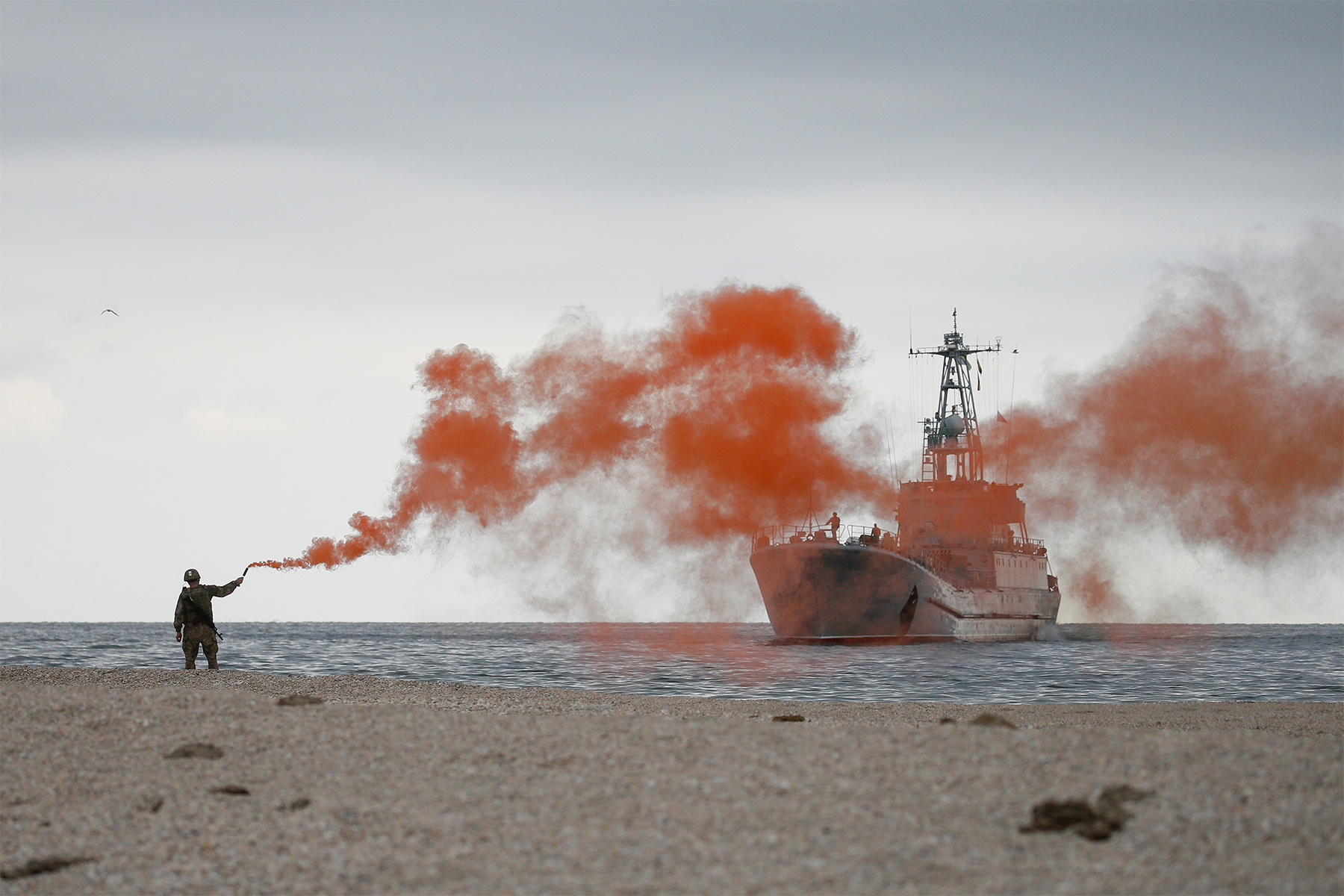
On the Road to “Strategic Depth” in the Black Sea Region
Still, it is important to emphasize several crucial points. Eurasianists include very different political groups with different understanding of this ideology itself. In Turkey, the label Eurasianist may unite anti-Western and pro-Russian groups. However, this does not imply that being anti-Western automatically refers to being pro-Russian. On the other hand, the group is attractive for left-leaning activists, even though there are aspects of right ideology of pan-Turanism and pan-Turkism in it.
Another important point is a scope of real influence of the Eurasianists. For decades, the group around Perinçek has managed to consolidate around its political platform many influential former military officers and wage successful media campaigns, their influence and, most importantly, access to the decision-making process remains, however, very limited. The fact that this group failed to prevent escalation between Turkey and Russian right after the jet crisis in November 2015 despite all its mediation efforts and alleged contacts with Russian side may indicate their limited influence on politics in Turkey. The influence of this political group may depend on current reforms of the Armed Forces where Turkish government is trying to establish new rules of the game making it harder for the officers to exert their political influence.
Thirdly, it is important to understand why Perinçek group in Turkey is popular today and enjoys benevolence of the ruling party despite its criticism of the current Turkish foreign policy and domestic policies of the AKP. One way to answer this question is to consider assumption that AKP doesn’t attach to ties with Russia strategic importance, using it merely as an instrument, implying that today’s rapprochement is driven by current international conditions where Turkey is experiencing lack of dialogue with its Western partners and, thus, feels increasingly isolated. On the other hand, it is fair to say as well, that Erdogan may be allowing the Perinçek group as much freedom mainly to communicate to the Russians red lines of cooperation that Turkey may have in many areas of mutual interests like Kurdish issue in Syria.
It is important to mention the role that other groups are playing in formation of bilateral official dialogue, be it negative or positive. Business circles represent the most potent forces that can in theory exert a level of influence. A number of Turkish construction companies like Ant Yapi, Renaissance Construstion, Enka, Limak, Costa Group are working and successfully expand its presence in the Russian market: in 1972–2016 Turkish companies participated in 8755 projects around the world with total value of USD 325 billion among them 1939 projects worth $64.8 billion in the Russian Federation. Naturally, Turkish companies operating in Russia have gained experience in handling with local political establishment and bureaucracy, sometimes engaging in non-transparent business schemes. This laid a foundation for further ties and connections with politicians on federal level.
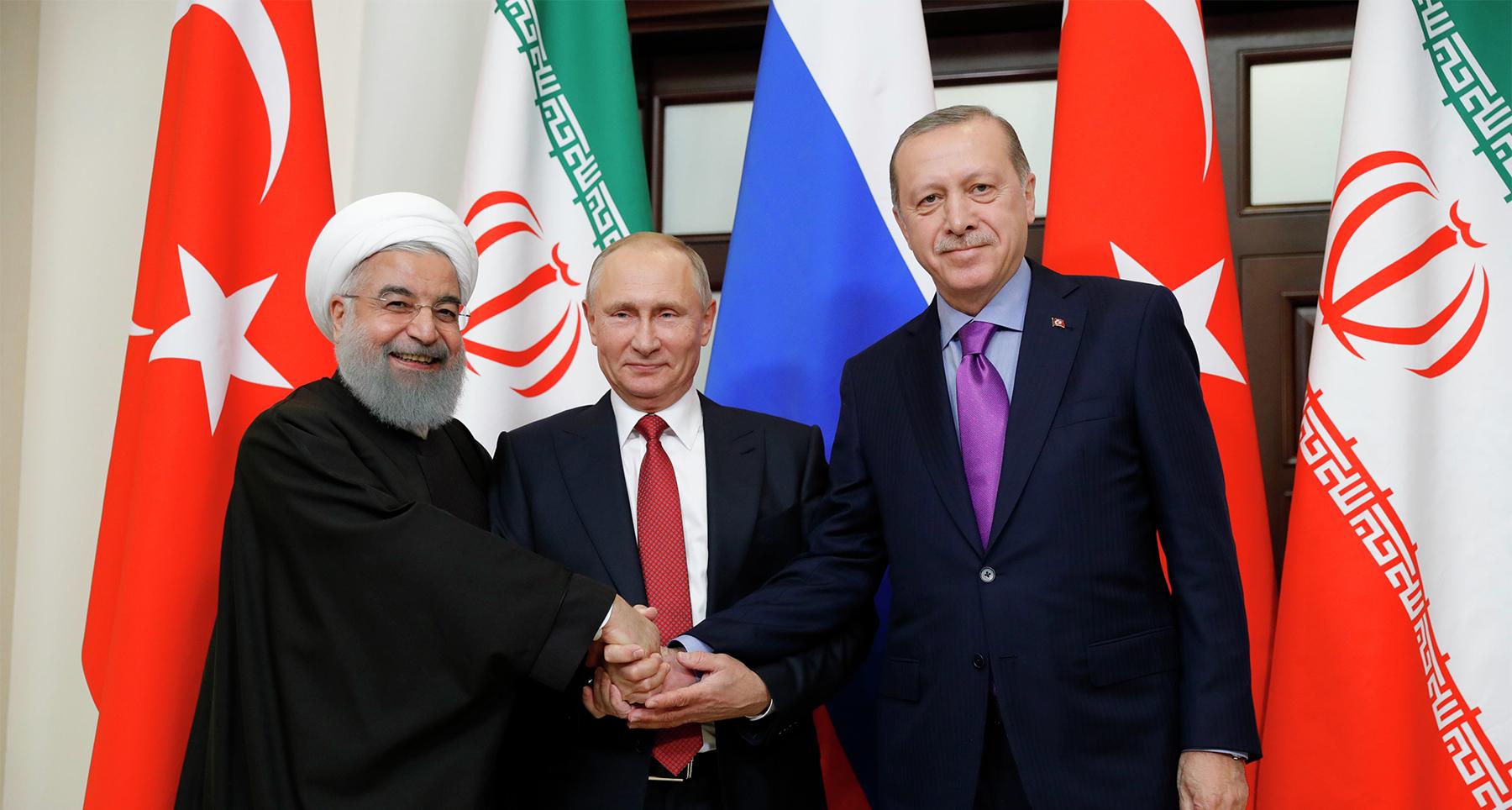
The Astana Shackles
But still, even if Turkish companies have limited influence in Russia, they are unlikely to have a say in strategic decision-making process, especially on security related issues. This could be seen from their participation in construction of very profitable objects. Russian business circles, with exception of energy and automobile giants like Gazprom, Rosatom, Gaz, is very poorly represented in Turkey and has very limited experience in dealing with Turkish clients with their own cultural specifics.
Another group that can influence bilateral relations are ethnic minorities. Historically, Turkey hosted refugees and emigrants from Russian Empire, Soviet Union and later Russian Federation. Today, groups like Crimean Tatars, Circassians, North Caucasian diasporas influence public opinion on Russia in Turkey, though their activity is limited due do strict Turkish nationalism and firm grip of current ruling party on media and public demonstrations. These groups may find themselves in the center of new frictions between Russia and Turkey, especially considering the ongoing migration of foreign fighters from Syria back to Turkey and Western Ukraine. Religious groups like South Caucasian Salafist networks still can pose a danger to Russian national security from Turkey thought its presence in Georgia and western Ukraine. Existence of sympathizers to the groups’ cause among Turkish bureaucracy may further complicate Russian-Turkish rapprochement and attempts to strengthen anti-terrorism cooperation.
The role of the West and third countries in dynamics of bilateral relations
Russia and Turkey perceive bilateral cooperation over gas supplies and Akkuyu nuclear plant as almost an ideal platform to improve their negotiating positions vis-à-vis the European Union. For Turkey, better terms for gas deliveries from Russia and Russian assistance in building of the nuclear facilities have direct implications for the long-term economic development plans, as Turkish government is expecting a rise in energy demands. On the other hand, Russia gets stable revenues from its exports to Turkey, a good asset for its budget stability in times of Western sanctions and pressures on domestic economic plans. All of this indicates that economic cooperation contributes to advancement of their negotiating positions via-a-vis Europe and the US.
By the same token, Russia has been using Turkey's support on multiple issues as a very effective asset in its own competition against the NATO. For Russian elites, Turkey's independence from the Western alliance is very important. A number of Turkish experts emphasized the fact that Turkey didn’t join Western sanctions imposed on Russia in 2014.
While both leading actors want to gain more influence in the global politics, this transformation, however, will not come without problems for bilateral relations. Turkish elites seem to have accepted the fact that without considerable Western backing Turkey has very limited room for action in the Central Asia. This approach is further nuanced by claims that Turkey is aware that its relations with Russia are uneven, especially in military and diplomatic terms, therefore, when and where possible, Ankara would like to counteract Russian dominance through soft-balancing, expanding discussions of NATO–Turkey cooperation, for example, in Georgia or Azerbaijan. Russian military build-up in the Black Sea is also causing concerns in Turkey. This claim can be related to the ongoing efforts of the Turkish government to increase navy capacities in territorial waters.
Another interesting point in terms of influence of the third parties in the bilateral relations is the role of the Central Asian leaders in this process. These leaders are forced to mediate between the two because of their political reliance on Russia and cultural affinity to Turkey. There are, however, tendencies in Russian policies to minimize Turkic solidarity with Turkey among Russian Turkic communities.
Informal dimension of bilateral relations
Despite political elites’ vocal support for and visible official efforts to strengthen non-official bilateral ties, connections between private parties, NGOs, and academia exert limited influence on official relations between Russia and Turkey. Primary reason behind this lies in systemic position of civil society in decision-making process in each country. According to experts, scholars, who make research on bilateral relations, often lack necessary linguistic skills. There is still ideological bias in many academic circles, both in Russia and Turkey as well. For example, sometimes, scholars, who write on bilateral relations, do it in a form to confirm their personal, professional, political loyalty to institutions or movements, meaning that the scope and tone of analysis may eventually change according to the agenda. That is why many Turkish or Russian speaking scholar prefer engaging in history and culture studies rather than doing research on current political affairs. There are problems of insufficient funding and institutionalization between academia in Turkey and Russia as well.
Civil war in Syria
Nowadays, Russia seems to be rediscovering itself as a global power again. Russian elites are eagerly engaged in the Middle East, and state-supported energy and military companies increase their impact in the regional political landscape. On the other hand, Middle East became by the matter of choice an area of foreign policy activism of Turkish elites.The AKP government has been increasing gaining self-confidence in dealing with regional issues, possibly, hoping that cultural and geographical proximity to local population may be translated into real life political and economic gains for Turkey.
Syria was possibly the prime example of recent regional activism of Turkey, but civil war changed this approach with rising instability threatening Turkish security and coming of many new global and regional players in the conflict. The problem for the Russian-Turkish relations is that Syria turned out to be an area where Russian and Turkish interests clashed. But eventually increasing number of challenges transformed foreign policy dynamics in Turkey, and securitization of the process led to re-evalutation of priorities, where closer contacts with Russia became to be seen as one of the channels to enhance security situation on Turkish borders. Moscow positively reacted to Turkish concerns over the PKK/Kurdish issues, seeing them as a legitimate topic of discussions with Turkey.
As far as we can see today, Turkish elites are trying to adapt to new realities by getting used to Russian presence. Watching NATO allies increasingly abandon Ankara, Turkish elites are trying to become more active in broadening areas of cooperation with Russia and Iran. Judging by the lessons from the past, Turkey and Russia are able to find a common solution and acknowledge their corresponding legitimate interests and concerns. Turkey’s cooperation with Russia is a tactical phenomenon that was caused by Western partners’ inability to show solidarity on many occasions and to act against Russia.
Differences over political issues like the fate of Assad’s regime or scope of rights for Kurds may be pushed from the agenda in the mid-term, allowing bilateral cooperation on Syria to be focused on economic matters like reconstruction, trade, energy projects. These are the areas that are important for Russian plans to rebuild Syria and that Turkey can be interested in as well. Still, Turkey would like to keep supporting opposition, because, otherwise it would have to deal with Assad through Russian mediation therefore falling into more dependence on Moscow.
Conclusion
Even though one may witness rapid development of political ties between Turkey and Russia in recent years, relations are not immune to unforeseeable shocks. Heavy accent on political dialogue, political connections and consultations between the governments may be of great importance in general, but at times reveal that it is insufficient for development of full-fledged relations. Today’s cooperation between Moscow and Ankara in Syria serves as a good platform for both to test their political trust and to learn to listen to each other’s concerns, which so far have been largely ignored or pushed out of the agenda. Despite current existing moods in Europe and the United States on Turkey planning to leave the NATO, analysis of historical legacy and present situation in the world suggest that Turkey neither would prefer nor would afford to leave the Western security and political structures. On the other hand, Turkey’s rapprochement with the West would not be necessarily against interests of Russia. Interconnectedness of Turkey with Europe and USA may be of good utility for Russian global foreign policy. Current positive dialogue, however, should be used to include non-state non-official players and give them space to direct and shape bilateral relations. Their presence and contribution would be a best guarantee against political fluctuations which we will definitely witness in the future.
(votes: 5, rating: 5) |
(5 votes) |
Russia is not an alternative to Turkey’s cooperation with the European Union; neither Turkey is a substitute for Russia working harder to resolve its problems with the United States and Europe
Russia and Turkey: Approaches to Regional Security in the Middle EastPragmatic partnership between the two states is characterized by de-ideologization and independence from the global conjuncture and previous trends
Mesut Özcan: Turkey and Russia Should Provide Guidance and Assistance in the Middle EastInterview with Mesut Özcan, Director of the Diplomacy Academy of the Ministry of Foreign Affairs of the Republic of Turkey
The Astana ShacklesIt is becoming increasingly more difficult for Moscow to retain its position as an honest, if not completely independent, broker
On the Road to “Strategic Depth” in the Black Sea RegionPre-emptive measures are required to avoid severe escalation


